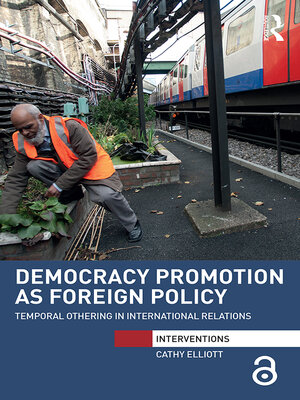Democracy Promotion as Foreign Policy
ebook ∣ Temporal Othering in International Relations · Interventions
By Cathy Elliott

Sign up to save your library
With an OverDrive account, you can save your favorite libraries for at-a-glance information about availability. Find out more about OverDrive accounts.
Find this title in Libby, the library reading app by OverDrive.



Search for a digital library with this title
Title found at these libraries:
| Library Name | Distance |
|---|---|
| Loading... |
This book looks at democracy promotion as a form of foreign policy. Elliott asks why democracy was seen to be the answer to the 7/7 bombings in London, and why it should be promoted not in Britain, but in Pakistan. The book provides a detailed answer to these questions, examining the logic and the modes of thinking that made such a response possible through analysis of the stories we tell about ourselves: stories about time, history, development, civilisation and the ineluctable spread of democracy.
Elliott argues that these narratives have become a key tool in enabling practices that differentiate selves from others, friends from enemies, the domestic from the foreign, civilisation from the barbarian. They operate with a particular conception of time and constitute a British, democratic, national identity by positing an "other" that is barbaric, alien, despotic, violent and backward. Such understandings are useful in wake of disaster, because they leave us with something to do: danger can be managed by bringing certain people and places up-to-date. However, this book shows that there are other stories to be told, and that it is possible to read stories about history against the grain and author alternative, less oppressive, versions.
Providing a genealogy drawing on material from colonial and postcolonial Britain and Pakistan, including legislation, political discourse, popular culture and government projects, this book will be of interest to scholars and students focusing on democracy promotion; genealogy; critical border studies; poststructural IR; postcolonial politics; discourse analysis; identity/subjectivity; and "the war on terror".







